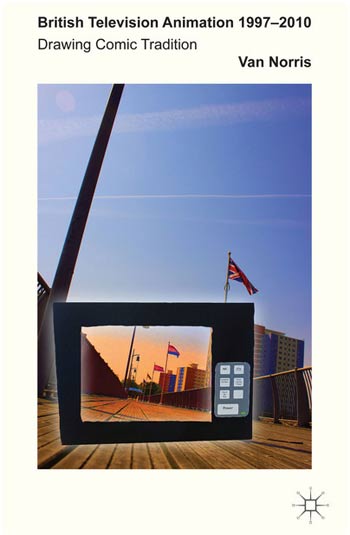
Book Review:
Animation British television 1997-2010: drawing comic tradition
Van Norris
(Palgrave Macmillan 0,244 page $ 0.90)
Ordering: $ 85.50 at Amazon
In the last quarter of the century, to find broadcasters countless hopes "come The Simpsons." In America this board said Eric Aaagh results in this series also received South Park and Family Guy, but things were in the UK otherwise. Past Simpsons create British (or later, South Park British) consists of testing Crapston Villas, pond life, Margaret and Bob! It is hell, Mr. Show, 2D TV, monkey dust, and I'm not an animal, throw modern, Popetown and Bromwell High, but none of them has achieved popular success of the USA's most famous brothers. What is the problem?
Tradition is dedicated to the creation of comic cartoons adult British comedy in the post-Simpson and tries to answer this specific question: The Book of the New Norris British Television Animation from 1997 to 2010.
Norris is assumed that the years 1997-2010 is the third wave of UK TV animation. The first wave began with the arrival of commercial television in the UK in 1955, while the second began in 1979 as a result of the boom in the seventies experimental animation. After Norris is part of the third wave began in 1997, at a time when the BBC 4 and moved away from the entertainment and Experimental American series are profitable affected by the work of more.
These periods also lead to changes in the political landscape of the UK correspond: the second wave lasted Conservative governments of Margaret Thatcher and John Major, while the latter include the work patterns Tony Blair and Gordon Brown. It is no coincidence, as one of the main themes of the book is the way it reacts to the news comedy.
Graphics Norris, like any tradition Music Hall on fees Bob Clampett feed Millennium UK animation, but his main concern is how the series as monkey dust itself is in line with the broader satirical British scene. Throughout the book alternates between Norris charm, a series of run-specific, he analyzed (and sometimes overanalyzes) in length, and the frustration with the shortcomings of the third wave as a whole.
Should the author of the Millennium animation with "alternative comedy" of the eighties Britain, which developed in opposition to the conservative Thatcher. Anti-racism, anti-sexist, anti-layered, loaded as an antidote against the stereotype comedy starring Benny Hill and Bernard Manning he acted.
Millennium British comedy, as described in the book is more fragmented in social commentary. The main reason for this is the concept of political correctness, which he described Norris as a concept vague, but still influential. He describes this as the third wave after the British animation politically correct (and politically incorrect) presents results in the often confusing than that: the opposition to political correctness is a strange scenario, the actors can be an act of minorities stupid anti-establishment be visualized created.
A major problem with the atheist and the British comedy twentieth century, says Norris, is obsessed with winning the lowest common denominator by nostalgia. It shows the live-action series, like my family and regression in a state of clemency in 1970, and animated series like Monkey Dust criticized for dredging tired stereotypes under the guise of the old cynical comment. While the ratification of the individual series convicted, Norris the third wave of UK TV animation as the ultimate outdated sense to say something about the world.
The book concludes with the prediction of the era of fragmentation continues, a fourth wave in motion leaves the public and distributed through the cracks of the Internet.
Animation 1997-2010 British television makes a good companion for Prime Time Animation: Animation, TV and American Culture Edited by Carol Stabile and Mark Harrison. During Stable detail successes behind the likes of The Simpsons and South Park, Norris explains how it all went wrong in a little elsewhere.
Join Cartoon Brew on Facebook for more fun animation!
No comments:
Post a Comment